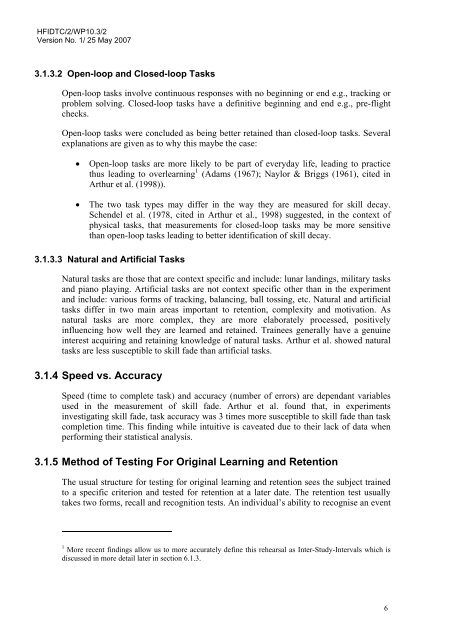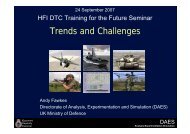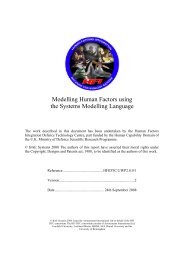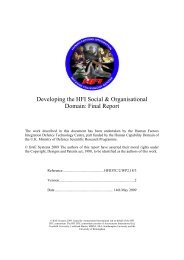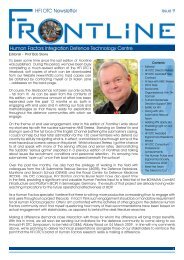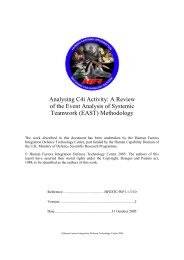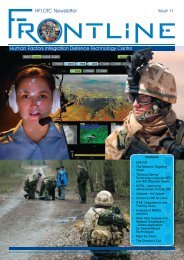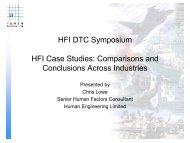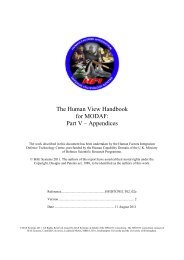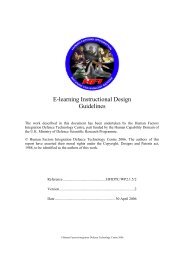Literature Review on Skill Fade - Human Factors Integration ...
Literature Review on Skill Fade - Human Factors Integration ...
Literature Review on Skill Fade - Human Factors Integration ...
Create successful ePaper yourself
Turn your PDF publications into a flip-book with our unique Google optimized e-Paper software.
HFIDTC/2/WP10.3/2<br />
Versi<strong>on</strong> No. 1/ 25 May 2007<br />
3.1.3.2 Open-loop and Closed-loop Tasks<br />
Open-loop tasks involve c<strong>on</strong>tinuous resp<strong>on</strong>ses with no beginning or end e.g., tracking or<br />
problem solving. Closed-loop tasks have a definitive beginning and end e.g., pre-flight<br />
checks.<br />
Open-loop tasks were c<strong>on</strong>cluded as being better retained than closed-loop tasks. Several<br />
explanati<strong>on</strong>s are given as to why this maybe the case:<br />
• Open-loop tasks are more likely to be part of everyday life, leading to practice<br />
thus leading to overlearning 1 (Adams (1967); Naylor & Briggs (1961), cited in<br />
Arthur et al. (1998)).<br />
• The two task types may differ in the way they are measured for skill decay.<br />
Schendel et al. (1978, cited in Arthur et al., 1998) suggested, in the c<strong>on</strong>text of<br />
physical tasks, that measurements for closed-loop tasks may be more sensitive<br />
than open-loop tasks leading to better identificati<strong>on</strong> of skill decay.<br />
3.1.3.3 Natural and Artificial Tasks<br />
Natural tasks are those that are c<strong>on</strong>text specific and include: lunar landings, military tasks<br />
and piano playing. Artificial tasks are not c<strong>on</strong>text specific other than in the experiment<br />
and include: various forms of tracking, balancing, ball tossing, etc. Natural and artificial<br />
tasks differ in two main areas important to retenti<strong>on</strong>, complexity and motivati<strong>on</strong>. As<br />
natural tasks are more complex, they are more elaborately processed, positively<br />
influencing how well they are learned and retained. Trainees generally have a genuine<br />
interest acquiring and retaining knowledge of natural tasks. Arthur et al. showed natural<br />
tasks are less susceptible to skill fade than artificial tasks.<br />
3.1.4 Speed vs. Accuracy<br />
Speed (time to complete task) and accuracy (number of errors) are dependant variables<br />
used in the measurement of skill fade. Arthur et al. found that, in experiments<br />
investigating skill fade, task accuracy was 3 times more susceptible to skill fade than task<br />
completi<strong>on</strong> time. This finding while intuitive is caveated due to their lack of data when<br />
performing their statistical analysis.<br />
3.1.5 Method of Testing For Original Learning and Retenti<strong>on</strong><br />
The usual structure for testing for original learning and retenti<strong>on</strong> sees the subject trained<br />
to a specific criteri<strong>on</strong> and tested for retenti<strong>on</strong> at a later date. The retenti<strong>on</strong> test usually<br />
takes two forms, recall and recogniti<strong>on</strong> tests. An individual’s ability to recognise an event<br />
1 More recent findings allow us to more accurately define this rehearsal as Inter-Study-Intervals which is<br />
discussed in more detail later in secti<strong>on</strong> 6.1.3.<br />
6


